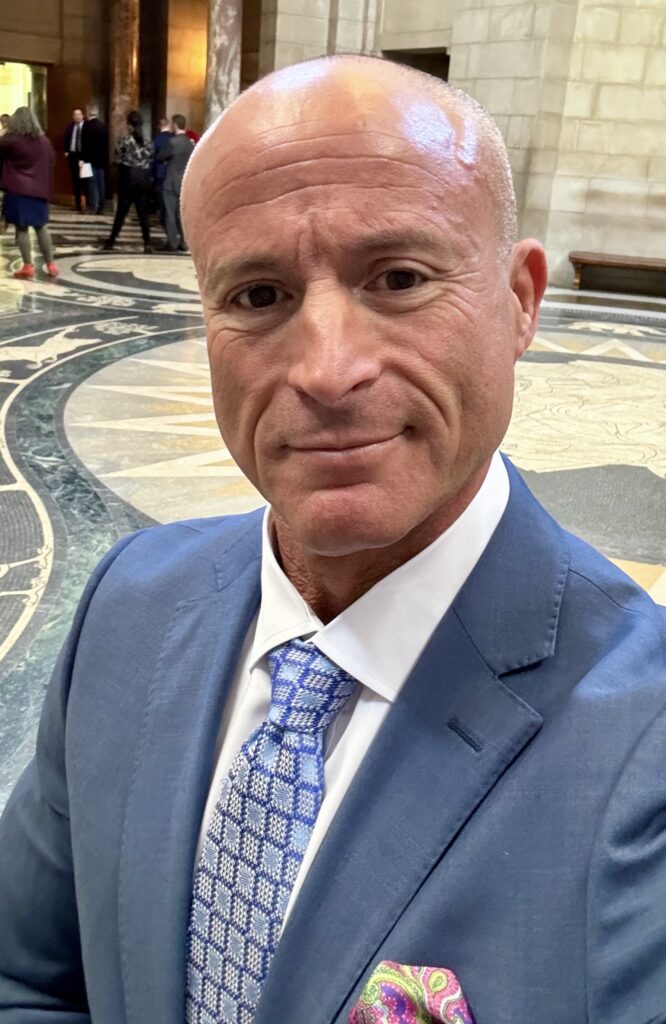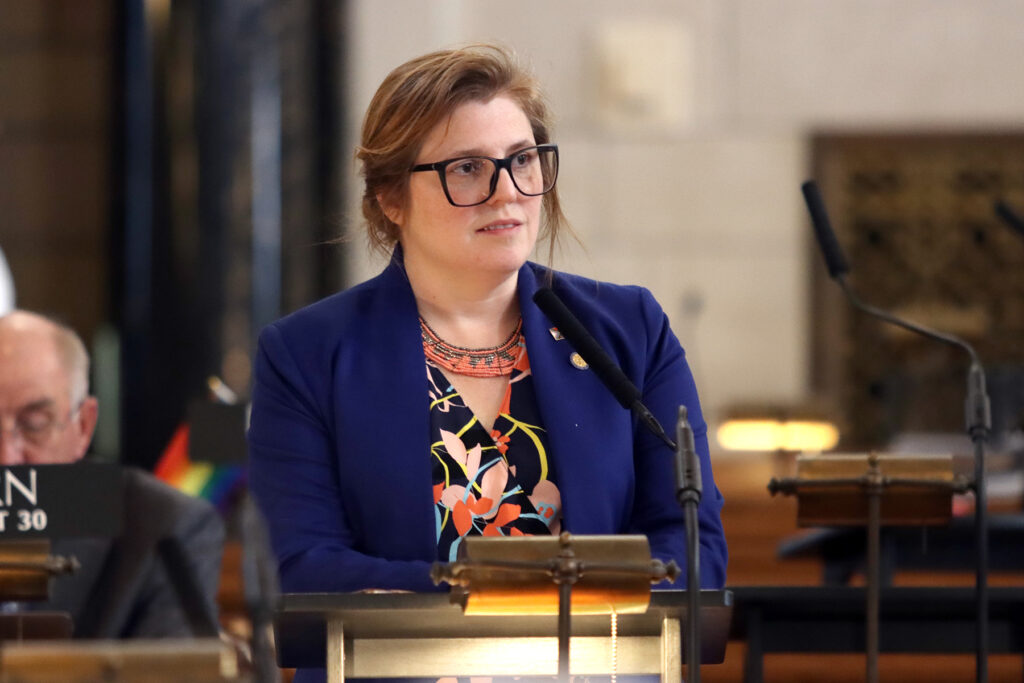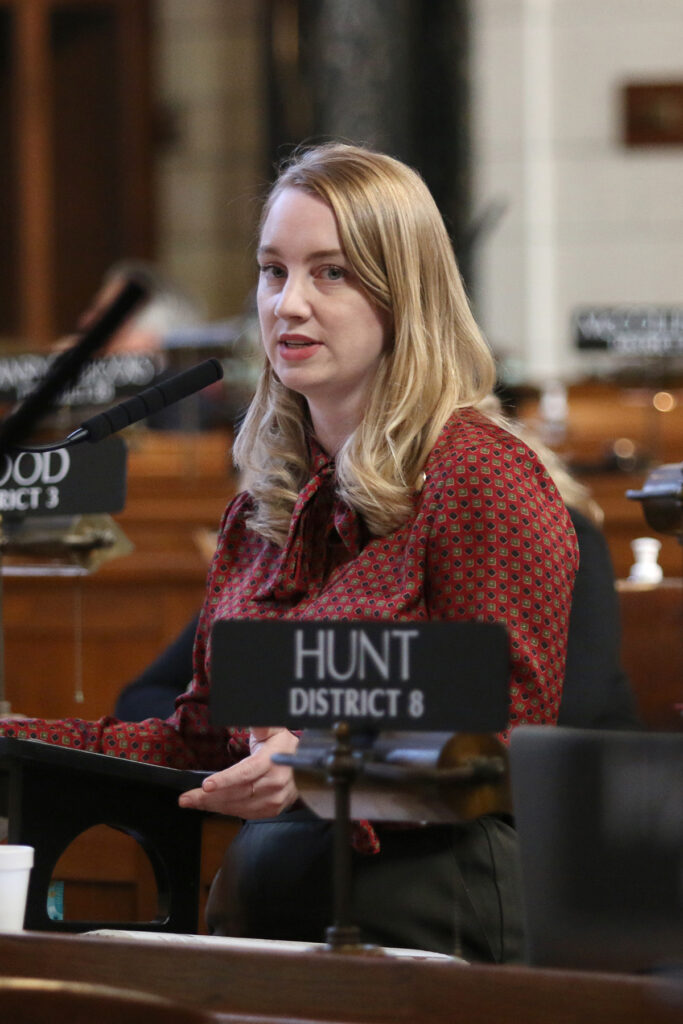On election night 2024, Omaha-area Democrats were on top — just not the way they had expected.
For the fifth time in a row they narrowly lost to Republican Congressman Don Bacon. And this time, the Democrats set a record they’d rather not hold.
Kamala Harris, the Democratic presidential candidate, won by a wider margin here than in any other district in the United States that also elected a Republican to Congress.
There are 435 congressional districts in the U.S.
The Democratic candidate, Tony Vargas, lost despite the fact that the Democratic candidate for president easily carried the district for the second straight time – this time Harris prevailed by 4.6 points, four years after Joe Biden carried it by 6.7 points.
Vargas and the Democrats lost despite the fact that ticket-splitting U.S. voters are largely disappearing.
And despite the fact that Omaha-area voters have in recent years slid from solidly Republican to left-leaning, according to the Cook Political Report.
Cook, which does nonpartisan political analysis, predicted the result of 47 competitive congressional districts before the 2024 election, in part by analyzing the voters in those districts.
They got 46 right. They got one wrong: Omaha.
“It says something about the Democratic brand there,” said Matthew Klein, a Cook analyst. “It says that the Democratic brand has a problem, that there’s probably something about it that people just feel more comfortable voting for a Republican and the Democratic Party hasn’t done a good enough job figuring out why.”
The more than 30 politicos, insiders and members of both parties interviewed by the Flatwater Free Press provided a litany of reasons why Democrats continue to come up short in Omaha — reasons why Republicans have controlled the Omaha-area House seat for 28 of the past 30 years and the Omaha mayor’s job for 12 straight years.
Bacon’s a good candidate skilled at fending off right-wing challengers in the primary and then winning over moderates in the general election, some said. Omaha Mayor Jean Stothert has overseen historic investment in the city’s urban core, long-held goals for mayors of both parties.
But signs of Democratic dysfunction are also contributing to narrow defeats, others said.
There’s friction between Douglas County and state Democrats, finger pointing from past and present leaders and growing discontent over the repeated losses.
In one recent example, turmoil engulfed a county-led get-out-the-vote effort — an effort that ended in a defamation lawsuit, bribery allegations, the state party revoking Omaha-area Democrats’ access to a voter database and then the county party filing its own federal account to send mail in the final, crucial weeks before Election Day.

“At the end of the day, if you can’t even get along enough to put together a damn slate card, that’s pretty telling,” said Barry Rubin, a former executive director of the Nebraska Democratic Party.
Rubin switched to nonpartisan in 2022 due to his frustration with the party. He’s now managing the Omaha mayoral campaign of Mike McDonnell, who also left the Democratic party following high-profile abortion and transgender care votes where he sided with Republicans.
“Ultimately we’re dealing with unprofessional amateur hour,” Rubin said. “And that’s why we’re getting killed.”
‘It’s hard enough to win’
Democrats have been losing in Nebraska’s 2nd Congressional District for a very long time.
In the late ‘90s and early 2000s – when the district’s Cook partisan ranking rested solidly in Republican territory — they lost badly. Double-digit margins. Over and over.
By 2006, it seemed no one would challenge Republican Rep. Lee Terry. Jim Esch, a 29-year-old lawyer with no political experience figured he’d try.
Despite being outspent two-to-one — most of the $359,157 he raised came from him or his own family — he cut significantly into Terry’s margin of victory.
But as the 2008 primaries approached, no one else stepped up to challenge Terry. Esch tried again.
That year, Barack Obama won the Omaha-area district — the first time a Democrat got an electoral vote from Nebraska since 1964.
Esch lost by 4 points.
It was the start of a pattern.
Whenever it seemed likelier for Democrats to win, they didn’t.
They lost, narrowly, during the “blue wave” of 2018 when the Democrats picked up 40 seats in the House of Representatives nationally, winning in most swing districts like Omaha’s. They lost when Democratic presidential candidates carried the district in 2008, then again in 2020, when Biden won and then again when Harris won the Omaha-area electoral vote in 2024.
Brad Ashford, the lone Democrat to represent the district since 1995, won in 2014 during a “red wave” for Republicans. He lost two years later.
The latest defeats seem spurred by dysfunction, Esch said. After watching from the sidelines since his last defeat, Esch wanted to help in 2024. But as he talked to politicians, insiders and donors, it became clear to him that everyone wasn’t on the same team.
“I don’t understand it,” Esch said. “It’s hard enough to win, let alone when half the people don’t like each other.”

In October the state cut off the county’s access to software used to log voter data, inform get-out-the-vote campaigns and track turnout. In an interview, State Sen. Machaela Cavanaugh called the move “shameful” and “unconscionable.”
“It is extremely concerning that weeks before the election, the largest Democratic county in the state lost access to their voter file,” the Democratic Omaha state senator said. “That alone speaks volumes to me about the dysfunction.”
Jane Kleeb, chair of the Nebraska Democratic Party, said the state party had to enforce consequences because the county Democrats had broken clear rules by starting a separate federal fundraising account. The state party still provided the county party access to a different version of the voter tracking software, she said.

The controversy started when the county party hired Cerberus Strategies in 2023 to try to win back unreliable voters in North and South Omaha.
Cerberus Strategies is owned by Benjamin Onkka who is married to Crystal Rhoades, who also works with the company. Rhoades is the Douglas County Clerk of the District Court and a former Douglas County Democratic Party chair. She and Kleeb have often clashed.
Dulce Sherman, a Douglas County delegate to the Nebraska State Democratic Party, publicly made allegations during a Douglas County Democratic Party meeting that the hiring of Cerberus suggested potential bribery, money laundering and violations of federal election laws. Sherman did not respond to a request for comment.
The local International Brotherhood of Electrical Workers union, which paid for the $40,000 canvassing effort, responded by suing Sherman for defamation, alleging she harmed the union by making “false, misleading, vile, and unsubstantiated accusations.”

In a statement, Onkka called the allegations “categorically false” and said the company is “reviewing our legal options.” Rhoades said it’s not illegal for elected officials to do campaign work and that this is about “petty personal grievances.”
Campaign finance records show that, during this fight, the county party filed for its own federal account and raised money to send out the printed materials featuring Democratic candidates just weeks before Election Day, and at a point where early voting was already occurring.
CJ King, chair of the Douglas County Democratic Party, said this intraparty fight had no impact on Election Day 2024. Kleeb agreed, saying the disagreement was “not even a big deal.”
But Jay Ignowski, the county party treasurer and also president of the local union, said the pushback stalled the get-out-the-vote effort. Despite early success — half of the thousands of people contacted in 2023 voted in the primaries, he said — the county Democrats scrapped plans to keep knocking on doors or put together earlier mail campaigns.
The union’s defamation lawsuit against Sherman, the state party official, is ongoing with a deadline to finish discovery by April 30.
That’s weeks before another important date for Democrats – Omaha’s May city election.
‘Mud wrestling’
Mayor Jean Stothert, a Republican, has beaten three Democrats since 2013.
Stothert unseated incumbent Jim Suttle. Heath Mello, a former state senator and current Omaha Chamber of Commerce president, kept it close in 2017, losing to Stothert by 6 points. But the Democrats’ next candidate, RJ Neary in 2021, got crushed by more than 30 points.
Stothert is winning in a city where Democrats outnumber Republicans 39% to 33%, though their advantage has been declining. Democrats do control the Omaha City Council and Douglas County Board 4-3.
These results stand in stark contrast to Lincoln, where Democrats have held the mayoral seat since 1999. They control the Lincoln City Council 6-1 in a city where Republicans outnumber Democrats 38% to 35%.
“In Lincoln, politics is like polo,” said Don Wesely, former Lincoln mayor. “In Omaha, it's like mud wrestling.”
In 1999, Wesely and two other Democrats all wanted to run for mayor. Rather than duke it out, Wesely said they polled voters and found he had the best shot. The other two stepped aside. Wesely won. When he stepped down one of the runner-ups in that poll took over.
It’s Republicans who appear to be wandering in the wilderness in Lincoln, failing to bump off Lincoln Democrats through term limits or flooding elections with historic amounts of cash.
In the upcoming Omaha mayoral election two Democrats have announced bids: Jasmine Harris, a nonprofit leader, and John Ewing, the Douglas County treasurer. Harris finished third in the 2021 primaries, failing to advance to the general election. This will be Ewing’s first mayoral run. He has hired Cerberus Strategies to run his campaign, Rhoades said.
McDonnell would have been a third Democratic challenger but switched parties in April 2024 following Democratic criticism after he supported a stricter abortion ban and a ban on gender affirming care for minors.
Douglas County Attorney Don Kleine also left after the state party said he was “perpetuating white supremacy” for declining to charge a white business owner who shot and killed a Black man during 2020 protests. Kleine did not return a request for comment.
State Sen. Megan Hunt, a high-profile progressive from Omaha, also left the party.

Kleeb said she did not agree with public criticism about McDonnell, particularly from the county party. She defended decisions made about Kleine and said Hunt’s exit had little to do with local Democrats.
Hunt has said she re-registered as nonpartisan after seeing the national Democratic party not supporting her and her colleagues while fundraising off their accomplishments. But frustration with the local Democratic parties played a part, she said.
“Everybody can see that we are dealing with unsuccessful leadership,” Hunt said. “It's not my place to say who the leader should be, but you can check the scoreboard and see that what we have isn't working. I don't know if that means the person needs to change, but it means that the plan needs to change.”
These intra-party disagreements aren’t new, said Brian Mikkelsen, a longtime political strategist in Omaha. Today, politics is “more inclusive, diverse, young and energetic, and with that comes robust and sometimes complicated discussions.” Kleeb’s team, Mikkelsen said, is the most effective he’s worked with in 35 years of campaigning.
King, the Douglas County chair, also defended the state party. He said the disagreement about the canvassing effort is not indicative of the long, positive relationship between the state and county parties.
Kleeb said the losses don’t tell the full story. The party was “neglected” before she took over in December 2016, she said. Since then it’s built grassroots programs and doubled the number of Democrats elected statewide, she said, while working to reverse a decline in Democratic voter registrations.
Rubin, the former party director, also doesn’t blame Kleeb. He learned about her tenacity when they faced off over the Keystone XL pipeline. Rubin cleared a path through Nebraska for the massive crude oil transport. Kleeb, and the movement she led, stopped it. As party chair, Kleeb works hard and does a good job, he said. But politics is a team sport.
“The problem,” Rubin said, “is the island of misfit toys she has to govern.”
Others chafed at how the party, and Kleeb’s nonprofit Bold Nebraska, funded races this cycle. Candidates for the Nebraska Legislature who lost close races against conservatives in Gretna, Bellevue and Elkhorn received $10,000 or less. Meanwhile candidates who lost in blowouts, won against other left-leaning candidates or ran unopposed got more.
The party’s priorities confuse Ari Kohen, political science professor at the University of Nebraska-Lincoln. Fighting anti-transgender care bills from State Sen. Kathleen Kauth of Millard consumed Democrats' time in the 2023 session, he noted. Yet Kauth herself appeared to face little opposition in the last election, Kohen said. Her opponent received only $3,500 from the state party, according to campaign finance records.
Instead, Kohen said, the party appeared laser focused on getting Harris the Omaha electoral vote.
“That seems like an error,” he said. “It sounds good on paper. It sounds like a feather in your cap to say, ‘We delivered this one electoral college vote’ … but it didn't end up being important to the outcome.”
Simple answers
For Ryan Horn, the answer to Democrats’ failures is two words.
Don Bacon.
“We've had presidential years. We've had non-presidential years. We've had white ladies, we’ve had Latino men. We’ve had high turnout, we’ve had low turnout. He's just done a good job,” said the Omaha-based Republican strategist.

Bacon works to keep constituents happy, Horn said. In 2023 Georgetown University rated him the eighth-most bipartisan House member, though he still voted with President Donald Trump 90% of the time, according to FiveThirtyEight.
He has occasionally bucked hardliners in his party, voting to codify citizenship rights for “dreamers,” people brought to America illegally as children, and supporting President Biden’s infrastructure bill. He’s also opposed gun control and twice refused to vote to impeach Trump.
In 2011 and again in 2021, the Republican-controlled Nebraska Legislature redrew the 2nd Congressional District boundaries in a way that aided Bacon or any Republican congressional candidate, adding more rural voters from Saunders County while subtracting Bellevue and other pockets of Sarpy County where voters are more likely to vote Democrat.
It’s also hard to beat an incumbent, said Randy Adkins, a University of Nebraska at Omaha political science professor. Especially one like Bacon, Adkins said, who makes smart moves like securing the endorsement of Ann Ashford, former Democratic congressional candidate and wife of the late Rep. Brad Ashford, who Bacon beat in 2016.
Democrats are also getting outspent in the Omaha area.
Outside groups spent $2.8 million more supporting Republicans than Democrats in the district in the 2024 election cycle, according to Open Secrets. They also spent $2.2 million more attacking Democrats than Republicans.
The last time Democrats spent more on attack ads: 2014. That’s also the last time they won the congressional race.
In the past decade, overall spending has exploded, as the Omaha-area district has become one of the most highly contested – and most expensive – battles for Congress in the country.
Klein, with the Cook Political Report, said “there is perhaps no district in America as consistently competitive as this one.” In the last five elections, Democrats running for Congress have on average lost by only 2.5%. Bacon’s victories here make him “from a purely mathematical standpoint, the most valuable” Republicans in the House of Representatives, Klein said
But 2026 might be Democrats’ year, he said.
“It is probably among the best pickup opportunities that they have just because it will be the single most difficult seat for Republicans to defend,” he said, “purely as a function of the partisanship of the district.”
Despite that, Paul Landow, a UNO political science professor and longtime top adviser to Democratic Mayor Mike Fahey, believes “it’s not very doable" for a Democrat to win in a district he believes still leans Republican.
It’s hard to sell a winning strategy without a top elected official already in place, he said.
“If there's nobody to organize around and nobody to look up to,” he said, “it's a problem on all levels.”
There’s debate about the right path forward for Omaha-area Democrats.
Kara Eastman, a progressive who lost two close races to Bacon and now lives in Chicago, said the party needs to lean into populist issues, take less corporate money and become a “party for the people” again.
Others interviewed said Democrats need to shift toward the center and stop fighting Republicans on social issues.
But in ads, Vargas talked about the middle class, immigration reform and being tough on crime. It felt like he had the right message, said Horn, the Republican strategist. Vargas and his campaign manager Meg Mandy didn’t return calls and text messages seeking comment.

When Horn tries to predict who’s going to win here, he thinks about Candlewood, a neighborhood that sits behind a Costco off the Dodge Street expressway.
Suburban voters have been a key to winning the Omaha metro. There are more registered voters in the precincts west of 72nd street, and these voters show up at higher rates than do east Omaha voters. The suburban voters lean Republican, but they’re also more likely to split their votes, particularly in 2020 when many voted Bacon for Congress and Biden for president.
“What I would tell (Democrats), which they would never do, is go get a moderate, white former Republican from Candlewood,” Horn said. “They have profile problems like this woke ideology … It drives people crazy.”

Winning
In December, the Nebraska Democratic Party, as well as the Douglas and Lancaster county parties, sent out a statement.
As the spring city elections approached, the three groups were “all in” to help Democrats win. They prioritized “finally electing a Democratic mayor in Omaha” and growing “our blue-dot cities” by building off the support progressive candidates received in November’s election. The state party would invest at least $100,000 in that effort, they said.
If Democrats can win here, it opens doors, Kleeb said in an interview. Democrats could then win in the 1st Congressional District, centered around Lincoln. If rural voters saw a Nebraska Democrat in Congress it might swing them toward the party, she said.
But winning won’t fix everything.
“We will never silence the haters,” Kleeb said. “They’ll say we should have won it sooner.”



8 Comments
I think this is a great look at what a lot of different people think is the issue for Democrats in Nebraska. The fact of the matter is that Democrats are just outnumbered.
Jane Kleeb, whose organization Bold Nebraska, stopped the Keystone Pipeline is a formidable leader. She has led the party with responsible and intelligent leadership. There’s not anyone in Nebraska who could have led the party better. (At least not anyone willing to.)
I was a member of the Democratic Party State Central Committee and was the Nebraska Stonewall Democrats Chair. Part of my intant as chair was to make sure that Democratic lawmakers and office holders supported the values of the Democratic Party, which include LGBTQ rights. Subsequently, more LGBTQ people became engaged and after my time as chair, LGBTQ Demcrats on the State Central Committee asserted their power which eventually led to he censure of Sen. McDonnell. They showed up and they asserted their power democratically. THAT’S THE WAY IT’S SUPPOSED TO WORK! If people don’t like that they also can show up and be involved in the decision-making and change the party focus.
What is often lost is the fact that ANYONE can attend a county party meeting, become a delegate to the Democratic Party state central committee, by showing up and voting, running for leadership positions, and helping to make the decisions that govern the party. ANYONE. The party we have is the party of the people who have showed up.
Well researched, well written, provides a balanced view – strong journalism by Chris Bowling. Describes the free fall of a party, and allows we independent voters to make up our own mind.
The time of the Independent candidate is coming. McDonnell will be our next Mayor, and Dan Osborn will replace Don Bacon.
Independent candidate, same same democrat, nobody buys it when it’s obvious
Good article.
I’m tired of hearing that Democrats need to “move center” to win. For some young progressives, frustration with Democrats stems from the very fact that they do kowtow to Republican messaging and ideology. We don’t want a Republican party and a diet-Republican party. Republicans will always be better at being Republicans than Democrats trying to offer what Republicans are in a “softer” package. If you look to Vargas’s campaign, I think this is very visible! Overall though, great to have this larger context and history of the Omaha voting record. Thanks for the research and transparency you bring to this topic!
I’ve got a slightly different take from the article but concur that Chris did a very nice job covering the recent history and many of the issues in Omaha. The Democratic issue must also be split, there’s a Nebraska problem of getting blown out in the 3rd district, getting better in the 1st and winning by 5% in Omaha and therefore not having a statewide Democrat elected in over 20 years. That is the state party problem and the problem I have with the state party. I can see the grass roots shooting sprigs here and there but result truly speak and its not very loud outside of Lincoln and the eastern hald of Omaha. The other issue is the theme of the article and is more thorny. The party needs to get behind the winner of the primary with full force. The problem I see with Heath Mello’s campaign as a prime example is he was left high and dry due to a purity test for all progressive positions. When will progressives, whom I love and have in my family, understand, we are not in NYC or Minneapolis or San Francisco where the Democrat usually tacks left to win? The independents in your graph are from both sides and do not prefer the far ends of their party that are making the rules.
Democrats in Omaha and Greater Nebraska HAVE to move to the center to win, period. if that means a candidate doesn’t personally favor abortion after 20 weeks or prefers more incentives for adoptions, that is where our voters are at. Yes there are some areas where Democrats have to stand for the rule of law and basic fundamental rights. After that, until you win, you’re not in the conversation and given the last two state administrations, we don’t have much time left before the current one does even more lasting damage and our most needed young minds and talent continue to flee our state. The Democrats need to change, the win loss record shows that, period. Once we accept that, lets get on the boat and row in the same direction.
In Mellos debate with Stohert he was destroyed, she knew he stuff and it probably didn’t have a large audience, You,re a democrat you want a Megan Hunt but will go with legacy names like a Cavanaugh where performance isn’t a factor